I wish I had the ability to draw well. There are often images in my head that I desperately want to create. Single frame polemics that can encapsulate my ideas with the stroke of a pen. But alas, in this instance, I am merely a writer limited through the tools of my craft to use words to render my thoughts.
I will start by saying I wanted to draw a picture of where the landscape was divided half France, half Nigeria. The crocodile tearful representatives of the western world followed by a sea of marchers would be callously walking over the bodies of dead children in Baga marching towards an array of media cameras and historians waiting for them in the Paris frame. A couple of the world leaders, one European, another African, would face us and talk into a United Nations press microphone uttering the words “sorry… they are not Charlie”.
Hopefully my crude photoshopped pastiche will do.
You see the Paris Unity march could have been a moment in world history when a diverse coalition of humans stood together in solidarity and publicly denounced prejudice based on ethnicity and faith. A moment where a global community symbolised by the presence of some 1.6 million people joined by 40 leaders from across the world said all life is precious, we will create positive change out of negative actions.
Instead the murdered staff of the controversial French publication Charlie Hebdo were turned into martyrs of free speech. This is despite their particular brand of speech freed them to regularly produce racist caricatures in the name of ‘critical secularism’ posing as satire.
But today the song of the Paris Unity march has reached its own crescendo. Today the French state has facilitated the release of a special edition of Charlie Hebdo featuring a prohibited image of the Prophet Mohammed (PBUH) on its front page.
Apparently the lesson learned by the participants in the Paris Unity march was not of the need to respect the ‘other’ and form new relationships based on agonism, but instead for the need to increase hostility and shatter trust through unnecessary antagonism.
How can those of us working for peace and justice be Charlie if Charlie represents that? How could I be in solidarity with some of the vilest political leaders present on that unity march when African people and other minority communities remain the victims of their inhumane policies? I would have to be on cocaine to ignore such an obvious contradiction. Freedom of speech does not liberate one from responsibility not to cause harm.
But I suppose I’m not supposed to say that am I? Now is not the time to discuss that. ‘We’ are mourning an attack on freedom of speech.
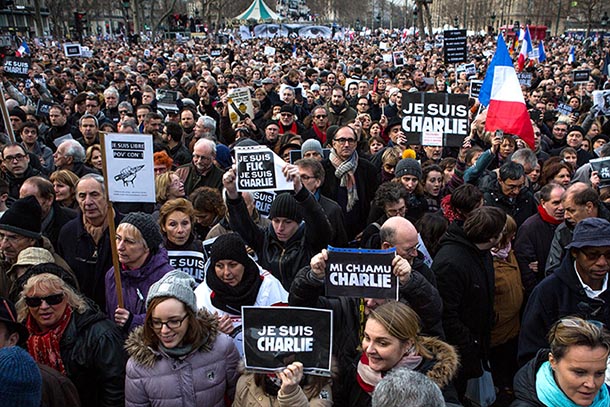
Many western figures in positions of authority have said ‘we had to do it’ in defence of the decision to be deliberately provocative in this alleged ‘clash of civilisations’. This attack on the freedom of speech they proclaim must be countered with an attack on unbelievers. Thus an act of secular ‘blasphemy’ should assert the moral authority of alleged modernity and civilisation.
They invite violence against us all from an extreme minority at the cost of harming a benign Muslim majority. But why? Whom are they seeking to retaliate against? The perpetrators of the crime are dead, executed without due process in a demonstration of state violence matching the ferocity of the original sin.
By all accounts the lost lives of Charlie Hebdo have been avenged, not only violently, but also creatively with the beautiful flurry of illustrations produced by cartoonists across the world who powerfully promoted the message of polemic satire as a superior counterfoil to repressive violence.
And yet, throughout all this dialogue, all this angst, there has been a failure to address the less comfortable parameters of this issue. The fact that the Charlie Hebdo team had a history of producing illustrations that lacked the political elegance and sophistication of many of their new supporters in death. But I will stop there with my critique of those who cannot defend themselves, my ethics and principles makes it difficult to denounce those so unjustly robbed of life.
Paradoxically, if I were Muslim this would be about the time an abrasive petulant journalist would be asking whether I condemned the actions of the extremists. I would of course, refuse to answer and from then on, any attempt to explain my perspective would be silenced as punishment for me failing to join the dramatic public ritual of grief.
I would not be given the freedom to ask why so many European civilians and world leaders were able to drop everything in an instant to participate in the mourning of those who we can understand why some argued were likely targets for assassination. And yet these same leaders, some African, failed to comment, mourn and act on supporting the families of the hundreds of lost lives in the recent massacre in Baga, Nigeria. Many of those killed included innocent children who none can truly believe deserved their fate.
But I’m not allowed to say that am I? Now is not the time to discuss that. ‘We’ are mourning an attack on freedom of speech, not the right to life - for all.
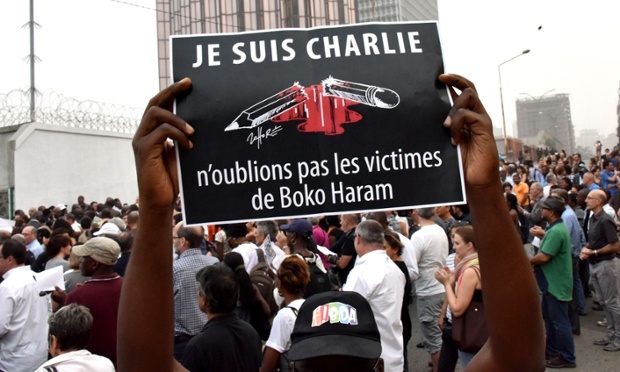
External Links
Boko Harams deadliest massacre: 2,000 feared dead in NigeriaWhy did the world ignore Boko HaramInside the Paris Unity march: we are free and we are not afraidIs Critique Secular?: Blasphemy, Injury, and Free SpeechFive Minutes with Chantal Mouffe: Most countries in Europe are in a post-political situation
I will start by saying I wanted to draw a picture of where the landscape was divided half France, half Nigeria. The crocodile tearful representatives of the western world followed by a sea of marchers would be callously walking over the bodies of dead children in Baga marching towards an array of media cameras and historians waiting for them in the Paris frame. A couple of the world leaders, one European, another African, would face us and talk into a United Nations press microphone uttering the words “sorry… they are not Charlie”.
Hopefully my crude photoshopped pastiche will do.
You see the Paris Unity march could have been a moment in world history when a diverse coalition of humans stood together in solidarity and publicly denounced prejudice based on ethnicity and faith. A moment where a global community symbolised by the presence of some 1.6 million people joined by 40 leaders from across the world said all life is precious, we will create positive change out of negative actions.
Instead the murdered staff of the controversial French publication Charlie Hebdo were turned into martyrs of free speech. This is despite their particular brand of speech freed them to regularly produce racist caricatures in the name of ‘critical secularism’ posing as satire.
But today the song of the Paris Unity march has reached its own crescendo. Today the French state has facilitated the release of a special edition of Charlie Hebdo featuring a prohibited image of the Prophet Mohammed (PBUH) on its front page.
Apparently the lesson learned by the participants in the Paris Unity march was not of the need to respect the ‘other’ and form new relationships based on agonism, but instead for the need to increase hostility and shatter trust through unnecessary antagonism.
How can those of us working for peace and justice be Charlie if Charlie represents that? How could I be in solidarity with some of the vilest political leaders present on that unity march when African people and other minority communities remain the victims of their inhumane policies? I would have to be on cocaine to ignore such an obvious contradiction. Freedom of speech does not liberate one from responsibility not to cause harm.
But I suppose I’m not supposed to say that am I? Now is not the time to discuss that. ‘We’ are mourning an attack on freedom of speech.

Supporters carried banners in solidarity with Charlie Hebdo
Justifying Secular Blasphemy
Many western figures in positions of authority have said ‘we had to do it’ in defence of the decision to be deliberately provocative in this alleged ‘clash of civilisations’. This attack on the freedom of speech they proclaim must be countered with an attack on unbelievers. Thus an act of secular ‘blasphemy’ should assert the moral authority of alleged modernity and civilisation. They invite violence against us all from an extreme minority at the cost of harming a benign Muslim majority. But why? Whom are they seeking to retaliate against? The perpetrators of the crime are dead, executed without due process in a demonstration of state violence matching the ferocity of the original sin.
By all accounts the lost lives of Charlie Hebdo have been avenged, not only violently, but also creatively with the beautiful flurry of illustrations produced by cartoonists across the world who powerfully promoted the message of polemic satire as a superior counterfoil to repressive violence.
And yet, throughout all this dialogue, all this angst, there has been a failure to address the less comfortable parameters of this issue. The fact that the Charlie Hebdo team had a history of producing illustrations that lacked the political elegance and sophistication of many of their new supporters in death. But I will stop there with my critique of those who cannot defend themselves, my ethics and principles makes it difficult to denounce those so unjustly robbed of life.
Paradoxically, if I were Muslim this would be about the time an abrasive petulant journalist would be asking whether I condemned the actions of the extremists. I would of course, refuse to answer and from then on, any attempt to explain my perspective would be silenced as punishment for me failing to join the dramatic public ritual of grief.
I would not be given the freedom to ask why so many European civilians and world leaders were able to drop everything in an instant to participate in the mourning of those who we can understand why some argued were likely targets for assassination. And yet these same leaders, some African, failed to comment, mourn and act on supporting the families of the hundreds of lost lives in the recent massacre in Baga, Nigeria. Many of those killed included innocent children who none can truly believe deserved their fate.
But I’m not allowed to say that am I? Now is not the time to discuss that. ‘We’ are mourning an attack on freedom of speech, not the right to life - for all.

A man holds a placard that reads ‘I am Charlie, let’s not forget the victims of Boko Haram’ outside the French embassy in Abidjan. Photograph: SIA KAMBOU/AFP/Getty Images
External Links
Boko Harams deadliest massacre: 2,000 feared dead in NigeriaWhy did the world ignore Boko HaramInside the Paris Unity march: we are free and we are not afraidIs Critique Secular?: Blasphemy, Injury, and Free SpeechFive Minutes with Chantal Mouffe: Most countries in Europe are in a post-political situation
Ligali is not responsible for the content of third party sites
Speak Out!
Click here to speak out or read (4) comments about this articleApparently the lesson learned by Paris Unity march participants was not of the need to respect the ‘other’ and form new relationships based on agonism, but instead for the need to increase hostility and shatter trust through unnecessary antagonism.
Toyin Agbetu, The Ligali Organisation
See Related:
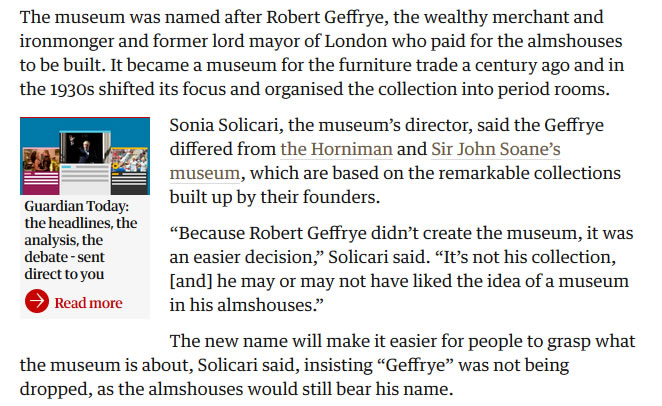
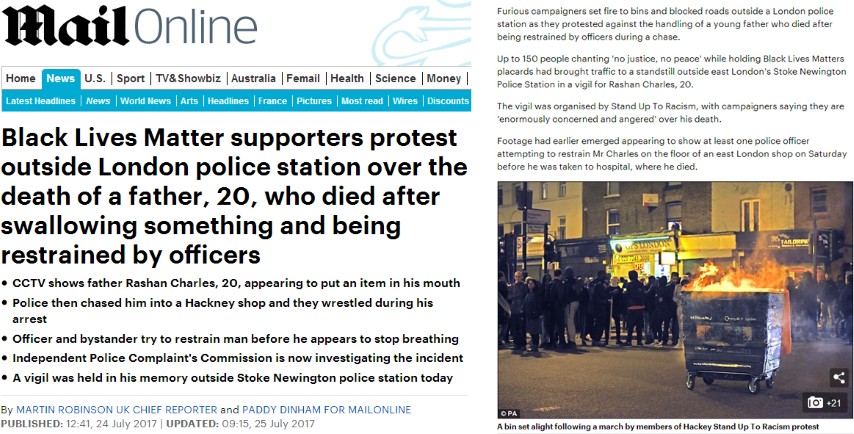

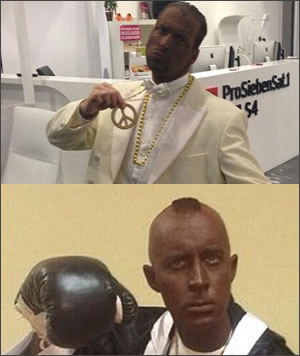

Get involved and help change our world